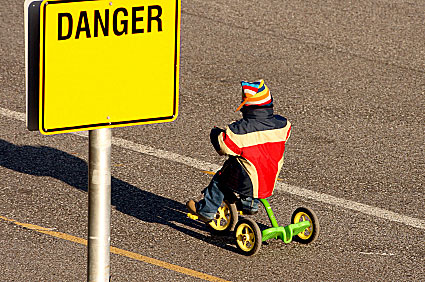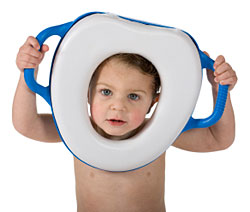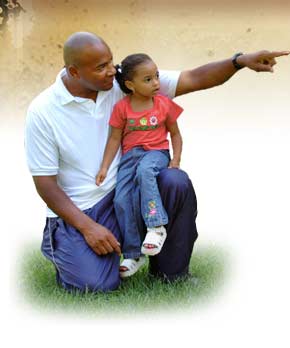Banners - Side
It only takes a few seconds for a child to drown or suffer irreversible, permanent damage from a near drowning. A toilet, bucket, hot tub bathtub, aquarium, or any other container of water can increase the risk for drowning. Drowning is the leading cause for unintentional injury deaths of children age 4 and younger. In children 14 and younger, drowning is second leading cause for unintentional injury fatalities.
Inside The House
- Never leave small children alone around any container of water. This includes toilets, tubs, wading pools, spas, aquariums, and buckets.
- Keep bathroom doors closed and secure toilet lids with lid locks.
- Safeguard bathtubs and sinks used for bathing by using faucet covers and nonskid mats or decals.
- Before bathing children, gather the soap, shampoo, toys, towel, diaper, clothing, and any other needed items before running the bath water. Place these items within easy reach.
- After running bath water, check the water temperature before placing the child in the bath water.
- Once your child is in the bath, don't leave for any reason. Children can drown in just a small amount of water. They can easily topple into the tub or toilet. It only takes a few seconds for a drowning to happen.
- If you must leave the room for the telephone or door, take the child with you after taking the child out of the water and wrapping him in a towel.
- To avoid falls and slipping under the water, always keep one hand firmly around the child when bathing him and keep the child sitting.
- Ensure pet doors are inaccessible to young children. Young children like to crawl through the doors to gain access to the outside.
Outside The House
- Never leave children alone with water including a pool, wading pool, pond, drainage ditch, or lake.
- Stay with children swimming or playing in water. They need an adult or certified lifeguard to keep a constant watch.
- Use approved life jackets.
- Arrange for swimming lessons for your children with a qualified instructor.
- Safeguard swimming pools. Use fences. Install self-closing and latching gates, and water surface alarms.
- Completely remove pool covers when the pool is in use.
- Make sure proper safety equipment is located near the pool.
- Store water toys away from the pool when they are not in use.
- Encourage safe practices. Don't assume young children will use good judgement and caution around water.
- Be prepared for emergencies. Have a first-aid kit and emergency medical telephone contacts. Learn CPR.
- Know if your child's friends have home pools.
Safety begins at home. Most people think their homes are safe. However, most injuries involving chlidren occur in the child's home. Using common safeguards can reduce the risk of injuries.
Choking
- Keep drapery, blind, electrical, and telephone cords out of reach.
- For children under 4, avoid hard, smooth foods like hard candies, nuts, seeds, grapes and raw vegetables that can lodge in the child's throat. Chop hotdogs, grapes, caramels, sausages and other like foods into small pieces.
- Keep small objects that can be swallowed off floors, tables, and other areas.
- Remove drawstrings and hoods from children's clothing.
Poisoning
- Keep cleaning supplies, chemicals, paints, and cosmetics in original containers. Use cabinet and drawer latches and locks.
- Keep all medicines, prescription and non-prescription, in original containers and out reach. Use child resistant bottles.
- Keep toxic plants out of reach.
- Keep purses carrying cosmetics, medications and small objects out of reach. Use child resistant bottles.
- Keep toxic plants out of reach.
- Keep purses carrying cosmetics, medications and small objects out of reach.
Suffocation
- Place infants on their backs to sleep.
- In cribs, avoid soft bedding, pillows and stuffed animals.
- Keep plastic bags away from children.
- Keep children from playing in parked cars, refrigerators, dryers, freezers and stoves.
Burns and Fires
- Set hot water heater thermostats to 120 degrees or less.
- Check bath water should be no warmer than 100 degrees.
- Baby's bath water should be no warmer than 100 degrees.
- Use back burners and turn pot handles inward when cooking.
- Avoid placing hot liquids within reach.
- Place matches, lighters, gasoline and other flammables out of reach.
- Use electrical outlet covers.
- Keep all electrical appliances like curling irons and irons out of reach.
- Place guards around all heaters, fireplaces, and barbeque grills.
- Install smoke alarms and fire extinguishers.
- Install carbon monoxide detectors in houses using wood and fuel heating.
Other Safety Tips
- Prevent falls on stairs by using safety gates at top and bottom of stairs.
- Prevent bathtub falls and injuries by using a bath mat and spout guard.
- Use colorful decals so glass doors are visible.
Lock unloaded guns and mmunition separately in a secure place. - Use locking safety devices on guns.
- Childproof doors and gates to prevent children leaving without being noticed.
- Watch children around dogs and other pets.
Be Prepared for Accidents
- Post numbers for Poison Center 1-800-764-7661 (1-800-POISON1), 911 for emergency services, and your doctor.
- Have a first aid kit.
- Learn first aid and CPR.
 Parents and caregivers: please take a moment to discuss safety with your child. This is a guide to help you as you review ways to keep your child out of harms way.
Parents and caregivers: please take a moment to discuss safety with your child. This is a guide to help you as you review ways to keep your child out of harms way.
I Will Always:
- get permission before going somewhere
- say no to drugs
- trust my inner feelings
- use the buddy system if I go somewhere
- run away from a stranger if approached
- tell someone I trust if someone touches me in a way that makes me feel uncomfortable
- know at least two escape routes from each area of the house in case of an emergency
- walk or play in groups
- call 911 if I'm scared and need help
I Will Never:
- keep secrets that make me feel bad
- accept gifts or money without first checking with my parents
- help a stranger with directions, find their lost pet or in any other way
- touch a weapon
- accept car rides unless I have permission from my parents
- go with anyone who does not know the family "secret code" word
- tell a caller I am home alone
Signed:
______________________________
Child
______________________________
Parent
The Key Is Not When You Are Ready But When The Child Is Ready
 When a baby learns to stand and walk, parents may begin thinking about teaching the child to use the potty. The key is not when you are ready, but when the child is ready. Problems in teaching children to use the potty almost always come from trying too soon. Typically, girls are ready before boys. Some children are ready around age 1, while others are not ready until age 3 or older.
When a baby learns to stand and walk, parents may begin thinking about teaching the child to use the potty. The key is not when you are ready, but when the child is ready. Problems in teaching children to use the potty almost always come from trying too soon. Typically, girls are ready before boys. Some children are ready around age 1, while others are not ready until age 3 or older.
When is a child ready?
Learning to use the toilet can start when a child has:
- Physical ability:
- is able to walk;
- has a larger bladder, so urinates fewer times a day;
- wakes up from a nap with a dry diaper;
- can control the muscles that hold and release urine and bowel movements; and
- can take underwear off and put it back on.
Mental ability:
- understands the body's signal for needing to use the toilet;
- understands words such as "peepee", "poopoo", and "potty"; and
- understands what is expected-when to go, what to do and where to do it.
Social and Emotional ability:
- can express needs, such as discomfort when she soils a diaper and tells you about it; and
- wants to learn to use the toilet.
How can you help your child learn?
- Talk with you caregiver. Parents and caregivers should agree on when a child is ready and what to do.
- Make sure the child can easily get to the toilet. Provide a potty chair in the bathroom or place a sturdy step stool by the toilet. Place toilet paper within easy reach.
- Dress the child in clothing that is easy to take off such as a dress, a skirt, or pants with an elastic waist.
- Use cloth training pants. Disposable paper training pants will seem like diapers to a child.
- Help your child overcome any fears of the toilet. The deep hole and loud flushing noise can seem scary. Fear of loud sounds could be a sign of other issues you may want to discuss with your child's pediatrician.
- Watch for signs that a child may need to go. This might include a frown or action such as holding the crotch.
- When the child urinates or has a bowel movement in the toilet, say "That's good". Avoid making to much of it. Children need to learn to use the toilet for themselves, not to satisfy you.
- Never scold or shame a child for an accident. These are natural body functions and children easily forget and get distracted.
- If a child has lots of accidents, go back to diapers for a while. Try again when the child seems ready.
Go slowly. Learning these skills takes time. Remember, the key is not when you are ready, but when the child is ready.
Great Ideas for Family Fun

- Go to a local high school football, basketball or any other game.
- Take the kids on a mystery trip. Give them clues about your destination as you get closer. It can be something as simple as an ice cream shop or playground, or a trip to a museum or amusement park.
- Put on a family play.
- Let your children prepare a meal and serve it to you and your husband restaurant style.
- Plant flowers (indoors in a flower pot or outside).
- Get to know the family of one of your child's friends by having the family over for a cookout.
- Let your kids take photos, print them, and make a photo album then have the kids think of captions.
- Have a fun, free scavenger hunt.
- Go to a park and take some pictures of landscapes. Develop the pictures, get out the paints and try to paint landscapes by looking at the pictures.
- Go on a bike ride that ends with a picnic.
- For girls: have a spa hour paint each other's nails, do your hair, let them put makeup on you.
- Build an obstacle course and let each family member compete for the best time.
- Have a garage sale and let your kids decide how to spend the proceeds on a family day.
- Plan a secret surprise for someone in need. For example, cook a meal for someone or mow their lawn, without them knowing who did it.
- Camp out in your back yard.
- Let the kids help you paint their room. Let them pick out the paint color. (It might get them to actually clean it first!)
- Play board games.
- Do a craft (make up your own or a buy a craft kit). Bake cookies, bread or a cake from scratch.
- Let your children design a family crest.
- Go ice skating or roller skating.
College Can Wait...Preschool's Going To Cost You
By: Dallas Child Magazine
 Families are likely to spend more on child care than for health care and food combined, according to the National Association of Child Care Resource and Referral Agencies. With childcare costs as high or higher than housing costs in most states, middle-income families struggle to afford any child care much less high-quality child care, notes the organization's executive director, Linda Smith.
Families are likely to spend more on child care than for health care and food combined, according to the National Association of Child Care Resource and Referral Agencies. With childcare costs as high or higher than housing costs in most states, middle-income families struggle to afford any child care much less high-quality child care, notes the organization's executive director, Linda Smith.
Now, a new national program launching first in the Dallas/Fort Worth area helps parents afford the quality childcare and preschool programs they want. I Pay Childcare's Educate Early loan program frees up more of a family's disposable income by giving them access to competitive interest rate loans and lines of credit specifically to pay for quality child care.
Parents can apply for the Educate Early loan program at participating childcare centers or directly through I Pay Childcare. Once approved, the family begins monthly payments. I Pay Childcare then debits the loan account every month and pays the childcare center, ensuring the center is paid promptly and the loan is used solely for child care a win-win scenario for both the parents and care providers.
I Pay Childcare's pilot program launched in November at Carpe Diem Private Preschool in Frisco. According to I Pay Childcare CEO Ben Robinson, the Dallas/Fort Worth rollout will be followed in 2008 by programs in Houston, Austin and San Antonio.
To find out if your child's school will be offering the program or to inquire about the possibility of adding your child's provider to the program, speak with your child's school director or contact Ben Robinson at I Pay Childcare, 866-543-7427.
Tips for Parenting When You're on Your Own
By: This email address is being protected from spambots. You need JavaScript enabled to view it.
As a single father, there is nothing more challenging or rewarding than being able to parent on your own.
The key is to realize you don't have to be a Superman in order to take care of your kids on your own. In fact, once you are on your own you may find that you are more than capable of tying ponytails and making a well-rounded meal than you ever thought before.
The key in all of this is to end your time as a solo parent with the same amount of energy, patience and enthusiasm that you started with. Whether you have one child, two or a half a dozen, practice the following and you'll be able to rule the roost.
Less is More? Always
The idea of packing up the kids and taking them to the mall, the zoo, their favorite restaurant and ending with a movie may sound like the perfect solution for keeping them occupied and the house clean. You may even think you?re a superstar for being able to do all of that, but is that really the best way to spend your time with your kids? Activities outside of the home are fine and serve as a positive boost for fathers wishing to build their confidence with a tot under one arm and a diaper bag under the other, but they can take their toll on your wallet, your patience and your energy level.
Replaced the urge to take your kids everywhere with the desire to give your kids everything of you through your time and attention.
Plan Ahead
If you find yourself wondering why the mother of your children seems able to do it all?feed the kids, clean the kitchen, do laundry, and attend to her own needs, there?s one secret that she?s probably not sharing because it?s so terribly obvious. She plans ahead! Whether it's going to the store before the fridge is reduced to condiments and cabbage, or placing the laundry by the washer and dryer the night before, she takes the necessary steps to streamline her days and maximize her effectiveness. This allows her to meet her responsibilities and react when necessary to the needs and wants of her kids.
For dads, take note. Make a list of the meals that you?d like to prepare for your kids and buy ahead. Cook meals and store them in your freezer, so they can be quickly prepared. Buy snack foods that are good for your kids (carrots, cottage cheese, fruits).
And be flexible. If you want Friday night to be spaghetti night, but you?re seeing some down turned faces because the kids would rather have grilled cheese sandwiches and slices of green apples then make the switch.
Keep It Balanced
Just because you're in charge doesn't mean that the rules of the house should suddenly change to no rules at all simply because the kids would love you for it. You know better because those rules are the only thing standing between you and a therapist's couch.
Try and work with your ex-wife to keep some standard rules for both households. This will ensure that your kids know the boundaries are the same whether they are with your or their mom.
It's Not a Competition
For all dads, especially single fathers, it's easy to feel beat down by the words that's not how mom does it. The desire to be the better parent is an impossible task. No one can replace the mother of your children. At the same time, no one can replace their father, either. These are unbreakable bonds. Just know when you hear those words from your kids that you've stumbled into a great teaching opportunity.
Ask them to show you how mommy does it. Does she cut off the crusts on the bread? Add olives to the homemade pizzas? Fold shirts in a certain way? Your kids will appreciate the opportunity to show you how they do things with their mom and on a deeper level they'll appreciate your acceptance of her efforts. It's a true win-win situation.
And most importantly there will be numerous occasions when that's not how daddy does it will come from your kids' mouths.
Don't Forget About You
The kids have had three square meals. You've ensured that the bubble baths included a complete shampoo and conditioner treatment. They've had a full day of fun and quality time with you. But what did you do for yourself? Did you find time in the day to catch your breath or to catch up on a few projects of your own? Time for you is essential and there is nothing selfish about getting a few minutes to yourself.
Being on your own with your kids doesn't mean around-the-clock parenting. It?s exhausting and will only sour you on more solo time with your kids in the future, so look for opportunities to recharge.
These can be simple and short opportunities to take a break with or without your child. Step into another room with a good book or newspaper while your child is playing. During nap time, call a friend and catch up on things. Go outside and take three deep breaths and listen to the world around you.
We all lead such hectic lives that it's good to teach our children how to take a step back and simply reflect on the world around us.
Accept Advice and Help
They say no man is an island and certainly that applies to fathers as well. Be open to advice and help. Don't ever take advice or an offer to help as criticism of your efforts. Being a complete father means being able to accept new ideas and support. If your ex-mother-in-law offers to take the kids for a lunch out, accept it with a thank you!? If a friend mentions carrying Wet Ones in the car, make a mental note to try it out (they're the best thing in cars, trust me). These aren't people looking to put you down. In fact, a father with a support group of friends and family has the best of both worlds the opportunity to parent on his own combined with the peace-of-mind in knowing he has others watching his back when he has to attend an after work meeting or pursue a much deserved break for an hour or two.
Clean Is Almost a Four Letter Word
Let's face it; men have always been considered hunters and gatherers rather than dusters and sanitizers. Our cleaning habits were rudimentary at best when we were single without kids and they've probably only improved marginally through the support and direction of ex-wives who grew tired of seeing their husbands pass a wet rag over the kitchen counter and then calling it clean.
There are two options to keeping your place clean when parenting alone. A father can either let the kids run wild and watch as toys and crayons become scattered to the four corners of every room. He can also let the dishes pile up in the sink while a similar pile of dirty clothes grows in the hallway. Okay, that's not really an option.
The best way to keep a clean house and manage kids on your own is to never take short cuts or put clean-up projects off until later. If you can, never leave dirty dishes in the sink. Wash and put them in the dishwasher. Dirty clothes? They always go in the hamper never on the floor. Toys are always returned back to their storage place at the end of the day or at the end of an activity. Make a habit of including your kids in these responsibilities and you'll find these activities can be fun, family-building opportunities rather than chores you do alone.
Show A Little Tenderness
When the roles are reversed and you are the one returning from the golf weekend with the buddies, keep in mind what it was like for you when parenting alone. Extend a heartfelt thank you to your ex-wife because while you were challenged by a 10 foot putt on the 11th hole, she was working as a solo mom and possibly not having the best time of it. So try a little tenderness because you never know when you'll want the same in return.
John Gaetz is a single father and a professional coach specializing in helping single parents reach their full potential as both parents and working professionals. He can be reached at: This email address is being protected from spambots. You need JavaScript enabled to view it.






 You've tried to interest your boys in curling up with a good book but what can compete with soccer, video games and TV? Not that there's much time for reading, anyway, between time spent fishing in their backpacks for tonight's homework and minutes wasted puzzling over half-remembered instructions for the assignment. Energetic boys can be an especially hard sell when it comes to picking up a book or getting organized. Now, educators and experts are coming up with new ways to help parents tease boys back on track.
You've tried to interest your boys in curling up with a good book but what can compete with soccer, video games and TV? Not that there's much time for reading, anyway, between time spent fishing in their backpacks for tonight's homework and minutes wasted puzzling over half-remembered instructions for the assignment. Energetic boys can be an especially hard sell when it comes to picking up a book or getting organized. Now, educators and experts are coming up with new ways to help parents tease boys back on track.